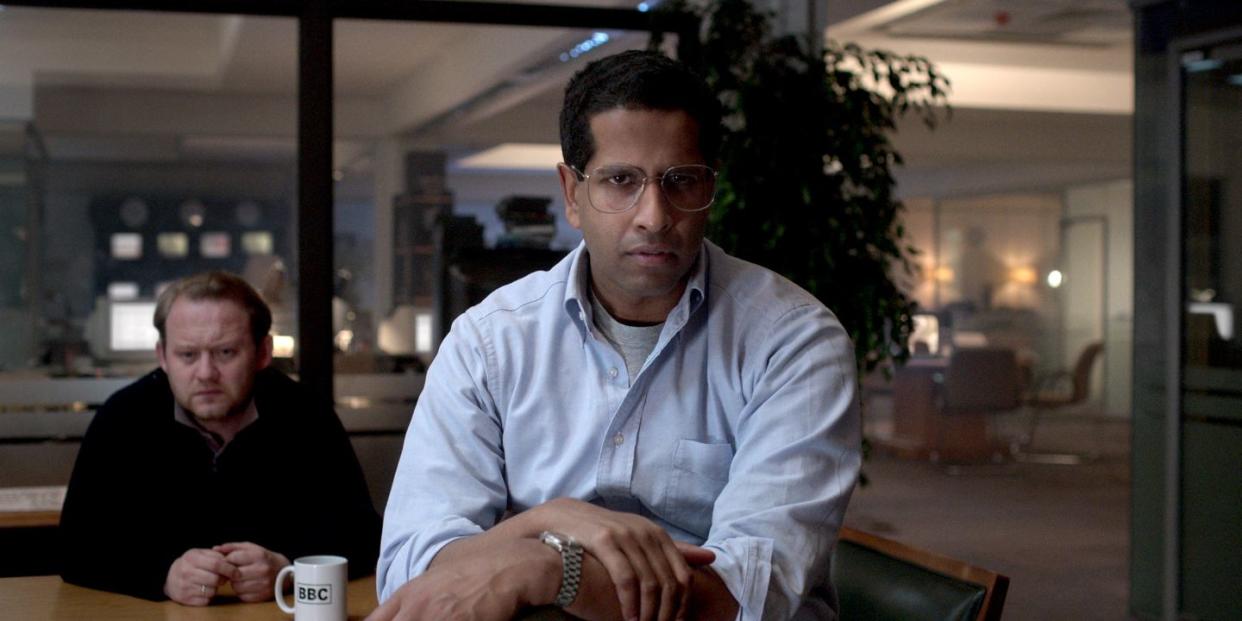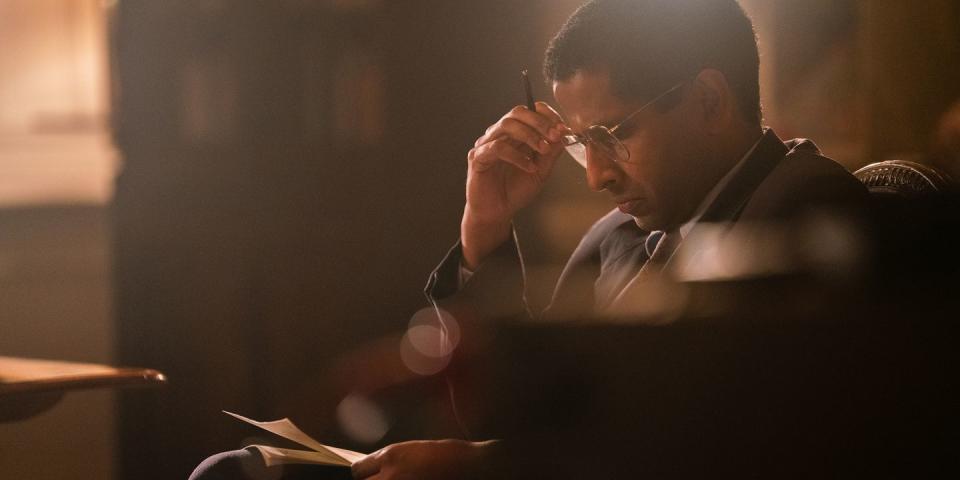The Crown's Prasanna Puwanarajah Didn't Judge Martin Bashir

"Hearst Magazines and Yahoo may earn commission or revenue on some items through the links below."
Martin Bashir may be the most controversial figure in the latest season of The Crown.
The show's fifth chapter, which follows the royal family from 1991 through some of 1997, focuses in on Princess Diana's infamous 1995 Panorama interview with Bashir—and the unscrupulous tactics Bashir, a British journalist, used to convince the Princess of Wales to sit down for the conversation, including forged bank statements and more.
Bashir, who was born and raised in London to Pakistani parents, joined the BBC in 1986, where he worked until 1999. The success of his Princess Diana scoop allowed him to land a role at ITV where he focused on special documentaries, including one where he interviewed Michael Jackson. Then, he moved stateside to work as an anchor for Nightline on ABC and later as a commentator on MSNBC.
He eventually returned to the BBC in 2016 where he became a religious affairs correspondent, before stepping down in 2021 following the inquiry into his interview with Diana. Princess Diana's brother, Earl Spencer, has criticized Bashir for his "appalling, deceitful conduct." Prince William, too, has resoundingly criticized the interview, without mentioning Bashir by name. He said, "It brings indescribable sadness to know that the BBC’s failures contributed significantly to her fear, paranoia and isolation that I remember from those final years with her."
Prasanna Puwanarajah, who takes on the role of Martin Bashir in season five of The Crown, tells Town & Country it's not his responsibility to judge Bashir's actions—that's up to the audience. Here, Puwanarajah opens up about his research process into Bashir, and what he hopes the audience takes away from the dramatization of the Panorama interview.

You've portrayed Martin Bashir twice now, first in 2013 in the movie Diana starring Naomi Watts as Princess Diana, and now again in The Crown season five. Can you talk about what it's been like returning to him?
I can, although I think it's probably overstating a little bit to say that I portrayed him the first time. I was actually cut from that movie. Diana was very much focused on her journey through that moment; his intervention in that moment, in that film, was really just as the back of a head. And I have a head that has a back. It was a standing start to prepare for this one.
What was your research process like in understanding Bashir and who he is as a journalist?
As always, it starts with the script and what's in there. As an actor, as a dramatist in a dramatization, that is all you have, really. And then you have this compendium of research materials; there's an incredible research department on The Crown. I watched a lot of interviews for a period of about 10 to 15 years or so of his working life, just to get a sense of how he functions in interviews—the observable things around his processes and so on.
And then we do voice work, we do bits of movement work, physical stuff. Mainly, from my point of view, not to try and come up with an impersonation, but just so things don't bump too much for the audience. Particularly, at this point in the telling of the story of the royal family, a lot of these figures are public figures in our present consciousness. The show seeks to keep people close to the dramatization rather than worrying about the level of depiction of individuals.
In the show, a key part of Bashir convincing Diana to do the interview with him is his Pakistani background. As an actor of Sri Lankan descent, what was it like leaning into his Pakistani identity in the show?

It's a really good question. I actually don't often get to play characters or people where their heritage is a complex and active part of their journey through a story space. Mainly because most of the parts that come to actors who are people of color were probably originally conceived for people who aren't people of color, and then just got sideways moved into a space of diversity.
And sometimes you end up going on set and being like, "So, okay, so obviously this guy's brown now." And they're like, "Oh, okay." As an actor, you end up bringing a lot of that work yourself. You have to decide what that individual's journey is, and it won't necessarily be there in the script. On this occasion, it is, and I've realized it's something that maybe my colleagues who aren't people of color don't have to think about that much. So it was also nice, in a funny sort of way, to not have to think about it much myself—and for it to just be real and live, and a natural part of who he was.
Martin Bashir and the Panorama interview have been in the news recently—due to the investigation into the tactics that he used to obtain the interview and BBC saying they're never going to air it again. In light of the news cycle, how do you view The Crown's decision to include the interview in the season?
Given that The Crown is depicting that period of the royal family's journey in this season, it would've been strange not to. It's so central to that, and it's so central to our understanding of that moment for the family and for Diana. It's one of many central elements in that decade.
And as a piece of dramatization, it's really trying to shed light on not only the interview, but the events leading up to it. The aim of it is to portray and reveal sensitively and with care, and [Crown creator] Peter Morgan's always been a careful dramatist [around] events that actually are a matter for public record now.
How do you understand this morally complex character and his manipulation of Diana? Why do you think Bashir did what he did?
As an actor, you actually don't try and do that, because you can't play a moral position. As a performer, all you can play is what a person is trying to do and what makes it hard for them. And that means all of that research, all of that thinking, all of that preparation, and all that work that we did in rehearsals to work out the landscape of those scenes and the challenges in those scenes—then you are playing objectives and endpoints to which you are headed. I've always felt that. In this case, it's really important to maintain a kind of clear sight of those requirements, and then it's over to the audience to feel. It's not a prescriptive act, it's a much more watchful thing from my end.
You Might Also Like


